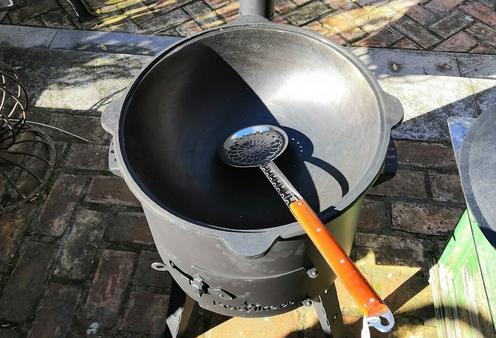Despite the cultural diversity and rich heritage of the peoples of Central Asia, certain elements unite them. Whether historically nomadic like the Kazakhs or sedentary like the Uzbeks, they all share a deep desire for harmony, family, warmth, and comfort. The hearth symbolizes and embodies this warmth—it gathers and unites people, provides a sense of security, and serves as the foundation for cooking meals.
In the past, families lived in one place for generations. However, today’s world has expanded: in search of work or opportunity, people may leave their homeland, relocating to another country or even another continent. This new environment may be vastly different, with unfamiliar customs and housing. For someone accustomed to a particular way of life, homesickness soon sets in. But can one take their home hearth with them?
Surprisingly, the answer is yes—in the form of a portable uchag.
Historians trace the uchag back to ancient times when people simply dug a pit in the ground, filled it with firewood, and placed a cauldron on top. Over time, this simple setup evolved into a full-fledged stove. However, a brick-built stove is not something one can take on the road.
And so, the portable uchaq emerged—a true salvation for those who find an electric stove insufficient, for those who love authentic traditional cuisine with its rich aromas and bold flavors.
The Uzbek company Davr Metall, based in Namangan, specializes in producing uchaqs, kazan pots, grills, saj pans, and other culinary accessories.
“The company was officially founded in 1993,” says Shukhrat Tursunov, Head of the Export Department. “However, its story began even earlier—with simple nails.
In 1991, when the Soviet Union collapsed, the former republics were left to fend for themselves. Life had to be rebuilt almost from scratch. The founder of our enterprise, Abdulkhodi Samatov, initially made a living by selling nails imported from Russia in Uzbekistan. But that wasn’t enough for him—he decided to set up his own production facility in Namangan. In Russia, he bought old, discarded machines used for making nails, brought them here, repaired them, and started manufacturing nails locally.”
— Why is the company called ‘Davr Metall’? What does it mean?
— There’s a certain philosophical meaning behind it. Davr in Uzbek translates to ‘time,’ ‘era,’ or ‘period.’ Metall, as you can easily guess, means ‘metal’—something strong, both flexible and durable, something hard to break. For Abdulkhodi Samatov, it symbolized not just the era of metal, but also a time of change—changes that had come upon us, carrying the seeds of something new, a hope for a better future.”
— So, you started making nails, but you didn’t stop there…
— That’s right. In 1995, we opened our first foundry, and from that moment on, we began casting iron and steel products. At first, we produced various components—gas and water pipeline valves—then we started working with tractor factories and agricultural machinery manufacturers. Among other things, we cast iron parts for cultivators. Then, in the 2000s, we started making kazan pots.
— How did that happen? You were producing industrial parts, spare components, large-scale equipment—and then suddenly, kazan pots?
— One day, a client from Russia came to us and said he urgently needed kazans. Historically, Namangan has always been a center for casting cast-iron kazan pots. We were already specializing in industrial manufacturing, but this was a new experience for us, so we started producing cast-iron kazan pots and cookware.
It turned out to be more challenging than one might think. Our very first kazans were quite rough, unfinished, and not very aesthetically pleasing. By the way, we still keep those first prototypes in our warehouse. We also have the very first machine that our founder, Abdulkhodi Samatov, brought from Russia, along with the very first nails that came out of it. We even kept some of the first Russian-imported nails.
It serves as a reminder that you can always achieve something great, even if you start with the smallest things.
Today, the founder’s son, Dilmurod Samatov, has taken over the business. He now runs the company and has successfully expanded production to four factories.
Dilmurod Samatov, CEO of DAVR Metall. Photo: DAVR Metall
— You mentioned that the first kazan pots were not very aesthetically pleasing. Why was that?
— Because at first, everything was done manually. And that turned out to be not ideal. First, it wasn’t very safe. Second, handmade production had a big impact on product quality. With manual casting, every piece is unique. That meant the final product depended on the craftsman’s mood, health, fatigue—basically, how he felt that day. Literally, everything was influenced by human factors. Now, we’ve automated the process, but the internal polishing and finishing are still done by hand.
— Did you have competitors?
— Yes, we did. They made the same products but at a lower cost. We maintained higher quality, but our prices were also higher. Customers, of course, wanted both quality and affordability. But we couldn’t compromise on quality—it’s our reputation. So, we had to look for new machinery, master new casting technologies, and improve our processes. We also focused on wholesale distribution. In the end, we managed to achieve both high quality and competitive prices.
— Your website states that in 2010, you launched a galvanized steel production line, followed by a rebar production line. What does your company manufacture today?
—Right now, we have four factories in Namangan. The first, our oldest facility, produces cast-iron products, nails, galvanized and tungsten wire, and various types of wire. This plant mainly serves export markets. The second factory focuses on the domestic market—it produces rebar and welding electrodes, but its primary function is stone processing, including travertine and granite. It also manufactures agglomerates.
The third factory specializes in reinforced concrete structures, mainly for the local market. The fourth plant is dedicated to stone extraction, with the processed material sent to the second factory. Additionally, in 2026, we plan to open a new plant focused on cast-iron products and portable stoves. So, as you can see, we have become a multi-industry company.
— Understood. But everyday consumers are most interested in household products.
— A couple of years ago, we launched a welding workshop to produce portable stoves, grills, and tripods. We also make special adapter rings that allow different-sized stoves and kazan pots to fit together. For example, if you have a 10-liter kazan but a 22-liter stove, you just use an adapter ring to create a perfect fit.
— Where do you export your products?
— Of course, the CIS countries, with Russia as our primary market. But we also sell our products in the European Union and the United States. You can even find them in Brighton Beach, New York. Still, Russia remains our biggest market. It has 140 million people, and many of them grew up using cast-iron cookware from the Soviet era—it’s safe and makes food taste amazing.
That said, in recent years, our sales in the EU have increased significantly and are now nearly equal to those in Russia. There are a lot of our people in Europe now, and they look for the things they are used to.
I’ve even heard that in Germany, people are specifically requesting Uzbek beshiks (traditional cradles), kurpachas (Uzbek quilted mattresses), and Risthan lagans (ceramic plates). The same goes for our products. Many online marketplaces where we are listed benefit from word-of-mouth recommendations, and every year, demand in the EU keeps growing.
— Do you have any issues with shipping?
— No, not really. We have excellent logistics partners, especially Posylka.de. But we have had some amusing incidents—though not directly related to business.
Once, we were shipping a load to Bulgaria. At the border, the truck was stopped, and officials told the driver, ‘You’re transporting people.’ He opened the truck, and there were two Syrians sitting inside! The driver was detained, and the truck was sent to a holding area.
Panicked, the driver called me, asking, ‘Where did these guys come from?!’ It turned out that while he was sleeping, these two had sneaked into the truck, hoping to enter Europe illegally. When the truck passed through a border scanner, they were spotted immediately. Fortunately, everything was quickly sorted out.
— Judging by your retail partners’ websites, your kazan pots and stoves are sold both individually and in sets. Is it significantly cheaper to buy a set?
— Of course. On Posylka.de, for example, a full set costs €292. It includes a stove, a kazan pot, a spoon, a spatula, a thermometer, a skimmer, and a ladle. If you buy just the stove and kazan separately, they already cost around €290, so buying the full set saves you about 20%.
— I remember that in Soviet times, people bought a couch, and it lasted for decades. Nowadays, if a couch lasts a couple of years, that’s considered good. How long does your cookware last?
— We offer a five-year warranty on our stoves. That means that no matter how intensively you use them, they won’t burn through or break within that time. But in reality, they last much longer.
As for our cast-iron cookware, the packaging features an infinity symbol. The official warranty is 100 years—but only because regulations require a specific time frame. In truth, cast-iron cookware lasts practically forever, so the infinity symbol is quite fitting.
P.S. If you live in Uzbekistan and want to share your business story—whether about your products or services—contact editor-in-chief Daniil Kislov at dan.kislov@gmail.com or reach out via Telegram 👉 through the “Fergana” channel.
Aleksey Vinokurov
-
 14 February14.02From Revolution to Rupture?Why Kyrgyzstan Dismissed an Influential “Gray Cardinal” and What May Follow
14 February14.02From Revolution to Rupture?Why Kyrgyzstan Dismissed an Influential “Gray Cardinal” and What May Follow -
 05 February05.02The “Guardian” of Old Tashkent Has Passed AwayRenowned local historian and popularizer of Uzbekistan’s history Boris Anatolyevich Golender dies
05 February05.02The “Guardian” of Old Tashkent Has Passed AwayRenowned local historian and popularizer of Uzbekistan’s history Boris Anatolyevich Golender dies -
 24 December24.12To Clean Up and to ZIYAWhat China Can Offer Central Asia in the “Green” Economy
24 December24.12To Clean Up and to ZIYAWhat China Can Offer Central Asia in the “Green” Economy -
 23 December23.12PhotoTokyo DriveJapan to invest about $20 billion in projects across Central Asia over five years
23 December23.12PhotoTokyo DriveJapan to invest about $20 billion in projects across Central Asia over five years -
 17 December17.12Sake for SixCentral Asia’s Rapprochement with Japan Comes with Hidden Pitfalls
17 December17.12Sake for SixCentral Asia’s Rapprochement with Japan Comes with Hidden Pitfalls -
 17 December17.12Gulshan Is the BestYoung Uzbek Karateka Becomes World Champion
17 December17.12Gulshan Is the BestYoung Uzbek Karateka Becomes World Champion


























